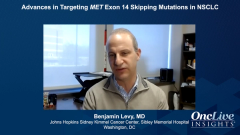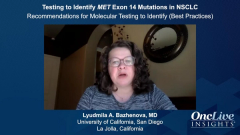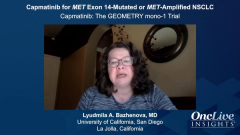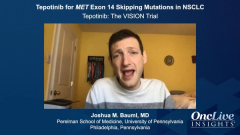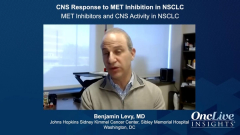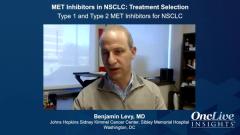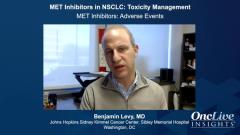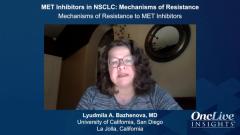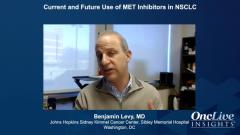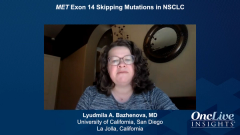
Current and Future Use of MET Inhibitors in NSCLC
Healthcare professionals who manage patients with non–small cell lung cancer comment on their current experience using MET inhibitors as treatment for patients who harbor MET exon 14 skipping mutations and highlight strategies under investigation that will hopefully address current gaps in therapy.
Episodes in this series

Joshua M. Bauml, MD: MET inhibitors are a wonderful addition to our clinical armamentarium to help patients with MET exon 14 skipping alterations. One thing we’ve got to figure out is how to raise that response rate. A critical issue is that not all MET mutations lead to the same degree of MET dependence. We need to have a better way of communicating that information to providers so they can get the right drug to the right patient.
The other thing that is critical is to evaluate whether combination therapies can lead to better outcomes. For instance, there are MET monoclonal antibodies, such as amivantamab, in development. We should explore whether combining a TKI [tyrosine kinase inhibitor] with a MET monoclonal antibody might lead to better outcomes.
In talking to our community oncology colleagues about MET exon 14 skipping mutations, the first step is to make sure you’re testing and to make sure the tests that you’re using will identify this reliably. At Penn [Perelman School of Medicine at the University of Pennsylvania], we utilize DNA-based next-generation sequencing to identify mutations and RNA-based next-generation sequencing to identify fusions. If you’re using only a DNA-based test, make sure you have full intronic coverage of MET so you don’t miss these important alterations.
Benjamin Levy, MD: Thus far, my experience with MET-directed therapies has been favorable. I have generally followed what came first, which was capmatinib, and have used this several times in my lung cancer practice. It’s been a favorable experience in the context of what we were generally able to offer these patients. Keep in mind that just 24 to 36 months ago we had chemotherapy with or without immunotherapy to give to these patients. Now we have better therapeutic options. I’ve witnessed this change over the past 5 years. We understood that this was a relevant mutation but didn’t necessarily know how to treat it. We were giving crizotinib. My experience with capmatinib has been favorable. The drug has been able to elicit meaningful responses in my patients. They’ve been durable. Importantly, they have improved quality of life. Many of my patients have aggressive disease, aggressive tumor biology. Giving this drug has salvaged them and improved their quality of life, so that’s important.
This is a call for molecular testing. If anything, what this tells us is that we can’t give a targeted drug unless we identify the target. My parting shot to community oncologists and others is that we need to make sure we are doing everything possible to uncover the genomic alterations so we can give these drugs and don’t have to give chemotherapy. We can improve quality of life, and then we can push the envelope in terms of longevity.
The final thing I’ll say is, what’s next? Where are we heading in this field? We will develop novel next-generation MET-directed therapies, targeted therapies in a similar fashion to what we’ve learned with capmatinib and tepotinib. The hope is that by identifying mechanisms of resistance, we can understand which drug works best and deliver that drug, similar to what we’ve done for EGFR and what we’re trying to do now. Next-generation targeted drugs will be coming and will be exciting.
There are other possibilities, though, for therapeutic strategies. These include MET-directed antibody-drug conjugates. These are antibodies that have a link to a chemotherapy, and those antibodies are directed at the MET receptors. There are multiple studies and multiple agents being looked at. There are also agents called MET bispecific antibodies that are being looked at. Then there are MET antibodies.
Moving forward, I’m most excited about 2 strategies. I’m excited about next-generation targeted therapies that may get at certain mechanisms of resistance, and I’m also excited about MET-directed antibody-drug conjugates. We’re just learning about antibody-drug conjugates. This is a therapy that’s been looked at extensively in breast cancer, and we’re starting to understand how that can be leveraged in lung cancer. I look forward to this. It’s an exciting time. Who would have thought 10, 15 years ago that we’d have all these drugs available for our use in the clinic, as well as others under the auspices of a clinical trial?
Lyudmila A. Bazhenova, MD: At this point, we are not able to say if treating our patient with MET exon 14 skipping mutations results in better overall survival rates. We don’t have that data. But one can certainly infer from other oncogenic driver mutations where we have effective therapy that survival is most likely going to improve. What I can say pretty confidently is that using MET TKIs for MET exon 14 skipping mutations results in the addition of extra lines of therapy for our patients. It is an oral therapy that is convenient to take, and it is generally well tolerated. It is very easy to assume that our patients will have improved quality of life if they are given MET TKIs. I also think, and I can’t stress this enough, you cannot help a patient with a MET exon 14 skipping mutation if you don’t know that your patient has a MET exon 14 skipping mutation. It is very important to test our patients. We now have 7 FDA-approved targeted therapies for our patients with lung cancer. One easy way to look for all 7 targets is to do next-generation sequencing, which saves tissue and also saves time if you’re going to look for all 7 abnormalities in the same test.
TRANSCRIPT EDITED FOR CLARITY


